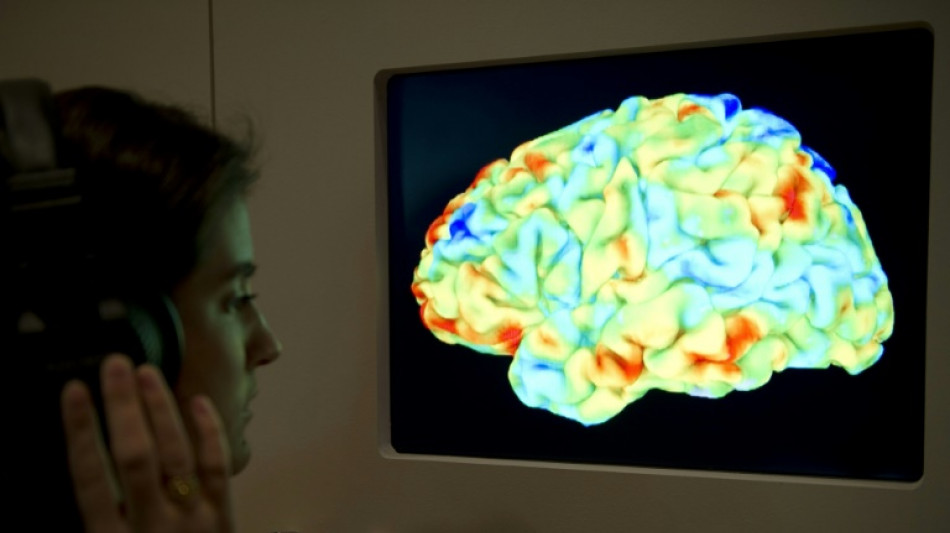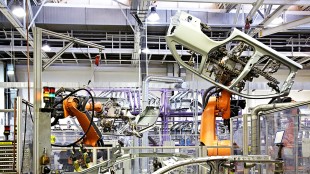
-
 Thousands of glaciers to melt each year by mid-century: study
Thousands of glaciers to melt each year by mid-century: study
-
China to impose anti-dumping duties on EU pork for five years

-
 Nepal starts tiger census to track recovery
Nepal starts tiger census to track recovery
-
Economic losses from natural disasters down by a third in 2025: Swiss Re

-
 Indonesians reeling from flood devastation plea for global help
Indonesians reeling from flood devastation plea for global help
-
Timeline: How the Bondi Beach mass shooting unfolded

-
 On the campaign trail in a tug-of-war Myanmar town
On the campaign trail in a tug-of-war Myanmar town
-
Bondi Beach suspect visited Philippines on Indian passport

-
 Kenyan girls still afflicted by genital mutilation years after ban
Kenyan girls still afflicted by genital mutilation years after ban
-
Djokovic to warm up for Australian Open in Adelaide

-
 Man bailed for fire protest on track at Hong Kong's richest horse race
Man bailed for fire protest on track at Hong Kong's richest horse race
-
Men's ATP tennis to apply extreme heat rule from 2026

-
 Cunningham leads Pistons past Celtics, Nuggets outlast Rockets
Cunningham leads Pistons past Celtics, Nuggets outlast Rockets
-
10-year-old girl, Holocaust survivors among Bondi Beach dead

-
 Steelers edge towards NFL playoffs as Dolphins eliminated
Steelers edge towards NFL playoffs as Dolphins eliminated
-
Australian PM says 'Islamic State ideology' drove Bondi Beach gunmen

-
 Canada plow-maker can't clear path through Trump tariffs
Canada plow-maker can't clear path through Trump tariffs
-
Bank of Japan expected to hike rates to 30-year high

-
 Cunningham leads Pistons past Celtics
Cunningham leads Pistons past Celtics
-
Stokes tells England to 'show a bit of dog' in must-win Adelaide Test

-
 EU to unveil plan to tackle housing crisis
EU to unveil plan to tackle housing crisis
-
EU set to scrap 2035 combustion-engine ban in car industry boost

-
 Australian PM visits Bondi Beach hero in hospital
Australian PM visits Bondi Beach hero in hospital
-
'Easiest scam in the world': Musicians sound alarm over AI impersonators

-
 'Waiting to die': the dirty business of recycling in Vietnam
'Waiting to die': the dirty business of recycling in Vietnam
-
Asian markets retreat ahead of US jobs as tech worries weigh

-
 Security beefed up for Ashes Adelaide Test after Bondi shooting
Security beefed up for Ashes Adelaide Test after Bondi shooting
-
Famed Jerusalem stone still sells despite West Bank economic woes

-
 Trump sues BBC for $10 billion over documentary speech edit
Trump sues BBC for $10 billion over documentary speech edit
-
Chile follows Latin American neighbors in lurching right

-
 Will OpenAI be the next tech giant or next Netscape?
Will OpenAI be the next tech giant or next Netscape?
-
Khawaja left out as Australia's Cummins, Lyon back for 3rd Ashes Test

-
 Australia PM says 'Islamic State ideology' drove Bondi Beach shooters
Australia PM says 'Islamic State ideology' drove Bondi Beach shooters
-
Scheffler wins fourth straight PGA Tour Player of the Year

-
 Nano One Receives C$10.9M from Financing and Government Programs
Nano One Receives C$10.9M from Financing and Government Programs
-
WelcomeVille Investment Association With Leadership From Reginald Pembroke Rolls Out a Digital Collaboration Platform

-
 Grande Portage Reports Advancements of Transportation Infrastructure at the New Amalga Gold Project
Grande Portage Reports Advancements of Transportation Infrastructure at the New Amalga Gold Project
-
Genflow Completes Dosing Phase of Canine Gene Therapy Trial

-
 President Trump Cleaning Up Biden's Marijuana Mess - MMJ Preparing to Move FDA Huntington's Cannabis Trials Forward
President Trump Cleaning Up Biden's Marijuana Mess - MMJ Preparing to Move FDA Huntington's Cannabis Trials Forward
-
Security beefed up for Ashes Test after Bondi shooting

-
 Wembanyama blocking Knicks path in NBA Cup final
Wembanyama blocking Knicks path in NBA Cup final
-
Amorim seeks clinical Man Utd after 'crazy' Bournemouth clash

-
 Man Utd blow lead three times in 4-4 Bournemouth thriller
Man Utd blow lead three times in 4-4 Bournemouth thriller
-
Stokes calls on England to 'show a bit of dog' in must-win Adelaide Test

-
 Trump 'considering' push to reclassify marijuana as less dangerous
Trump 'considering' push to reclassify marijuana as less dangerous
-
Chiefs coach Reid backing Mahomes recovery after knee injury

-
 Trump says Ukraine deal close, Europe proposes peace force
Trump says Ukraine deal close, Europe proposes peace force
-
French minister urges angry farmers to trust cow culls, vaccines

-
 Angelina Jolie reveals mastectomy scars in Time France magazine
Angelina Jolie reveals mastectomy scars in Time France magazine
-
Paris Olympics, Paralympics 'net cost' drops to 2.8bn euros: think tank


Scientists use brain scans and AI to 'decode' thoughts
Scientists said Monday they have found a way to use brain scans and artificial intelligence modelling to transcribe "the gist" of what people are thinking, in what was described as a step towards mind reading.
While the main goal of the language decoder is to help people who have the lost the ability to communicate, the US scientists acknowledged that the technology raised questions about "mental privacy".
Aiming to assuage such fears, they ran tests showing that their decoder could not be used on anyone who had not allowed it to be trained on their brain activity over long hours inside a functional magnetic resonance imaging (fMRI) scanner.
Previous research has shown that a brain implant can enable people who can no longer speak or type to spell out words or even sentences.
These "brain-computer interfaces" focus on the part of the brain that controls the mouth when it tries to form words.
Alexander Huth, a neuroscientist at the University of Texas at Austin and co-author of a new study, said that his team's language decoder "works at a very different level".
"Our system really works at the level of ideas, of semantics, of meaning," Huth told an online press conference.
It is the first system to be able to reconstruct continuous language without an invasive brain implant, according to the study in the journal Nature Neuroscience.
- 'Deeper than language' -
For the study, three people spent a total of 16 hours inside an fMRI machine listening to spoken narrative stories, mostly podcasts such as the New York Times' Modern Love.
This allowed the researchers to map out how words, phrases and meanings prompted responses in the regions of the brain known to process language.
They fed this data into a neural network language model that uses GPT-1, the predecessor of the AI technology later deployed in the hugely popular ChatGPT.
The model was trained to predict how each person's brain would respond to perceived speech, then narrow down the options until it found the closest response.
To test the model's accuracy, each participant then listened to a new story in the fMRI machine.
The study's first author Jerry Tang said the decoder could "recover the gist of what the user was hearing".
For example, when the participant heard the phrase "I don't have my driver's license yet", the model came back with "she has not even started to learn to drive yet".
The decoder struggled with personal pronouns such as "I" or "she," the researchers admitted.
But even when the participants thought up their own stories -- or viewed silent movies -- the decoder was still able to grasp the "gist," they said.
This showed that "we are decoding something that is deeper than language, then converting it into language," Huth said.
Because fMRI scanning is too slow to capture individual words, it collects a "mishmash, an agglomeration of information over a few seconds," Huth said.
"So we can see how the idea evolves, even though the exact words get lost."
- Ethical warning -
David Rodriguez-Arias Vailhen, a bioethics professor at Spain's Granada University not involved in the research, said it went beyond what had been achieved by previous brain-computer interfaces.
This brings us closer to a future in which machines are "able to read minds and transcribe thought," he said, warning this could possibly take place against people's will, such as when they are sleeping.
The researchers anticipated such concerns.
They ran tests showing that the decoder did not work on a person if it had not already been trained on their own particular brain activity.
The three participants were also able to easily foil the decoder.
While listening to one of the podcasts, the users were told to count by sevens, name and imagine animals or tell a different story in their mind. All these tactics "sabotaged" the decoder, the researchers said.
Next, the team hopes to speed up the process so that they can decode the brain scans in real time.
They also called for regulations to protect mental privacy.
"Our mind has so far been the guardian of our privacy," said bioethicist Rodriguez-Arias Vailhen.
"This discovery could be a first step towards compromising that freedom in the future."
M.Thompson--AMWN


